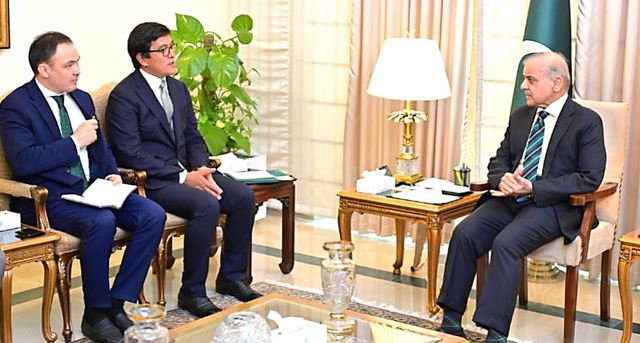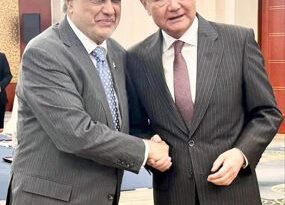PM Shehbaz welcomes slew of agreements signed with Kyrgyzstan
Pakistan-Kyrgyzstan trade & investment forum held
Both countries reaffirm resolve to work closely for mutual benefit of two nations
Staff Report
ISLAMABAD: Prime Minister Shehbaz Sharif has lauded progress in Pakistan-Kyrgyzstan cooperation, while welcoming a slew of agreements signed between the two countries.
Talking to a high-level delegation from the Kyrgyz Republic, led by Deputy Chairman of the Cabinet of Ministers Edil Baisalov, in Islamabad on Tuesday, PM Shehbaz Sharif expressed satisfaction over the successful convening of the 5th session of Pakistan-Kyrgyzstan Joint Intergovernmental Commission.
The prime minister appreciated the signing of the Protocol and several Memorandum of Understandings (MoUs) between the two sides, calling them important steps towards enhancing trade, energy, collaboration, connectivity, and people-to-people exchanges.
He reiterated Pakistan’s strong commitment to implementing the decisions taken during the Intergovernmental Commission and stressed the importance of timely follow-up to translate the agreements into tangible outcomes.
The Kyrgyz side appreciated the efforts of the Government of Pakistan in fostering closer bilateral ties and expressed confidence that the outcomes of the Intergovernmental Commission would lead to deeper and more result-oriented cooperation.
Both sides reaffirmed their resolve to work closely for the mutual benefit of their peoples and to continue engaging at all levels for stronger Pakistan-Kyrgyzstan relations.
Pakistan and Kyrgyzstan have reaffirmed their resolve to boost bilateral trade volume to 100 million dollars.
This resolve was expressed at the 5th two-day session of the Pakistan-Kyrgyzstan Inter-Governmental Commission on Trade, Economic, Scientific and Technical Cooperation which was held in Islamabad on Monday.
The session was co-chaired by Minister for Energy Sardar Awais Ahmad Khan Leghari and Deputy Chairman of the Cabinet of Ministers of Kyrgyzstan Edil Baisalov.
Both sides agreed to work on diversification of exports and imports, revive the Pakistan-Kyrgyz Joint Business Council, and organize business forums, trade fairs, and B2B exchanges. A number of Memoranda of Understanding were signed to deepen cooperation in key sectors.
In the energy and environment domain, the Kyrgyz side proposed joint participation in a power transmission line project connecting Kyrgyzstan, China, and northern Pakistan. Both countries agreed to explore electricity imports, collaboration in renewable energy, mining, hydrocarbons, and technical partnerships between institutions like the Hydrocarbon Development Institute of Pakistan and the Kyrgyz State Technical University.
Discussions also focused on enhancing regional connectivity through logistics and transportation. They agreed to deepen cooperation in postal services, cargo and rail transport, and civil aviation. Pakistan proposed that Kyrgyz airlines shift from charter to regular passenger flights for improved service.
Pakistan also took note of Kyrgyzstan’s proposed new air route linking with China and expressed interest in further dialogue on regional air connectivity. The Kyrgyz side also proposed Pakistani participation in a high-speed fiber-optic communication line project along the Pakistan-Kyrgyzstan route.
Besides, the central banks of both countries agreed to collaborate on the development of Islamic banking and financial instruments, including training programs through Pakistan’s National Institute of Banking and Finance.
In the health and pharmaceutical sectors, both parties agreed to accelerate discussions on cooperation in medical education, pharmaceuticals, and surgical instruments. Pakistan welcomed Kyrgyz proposals to facilitate the participation of Pakistani companies in public procurement and to support the registration of Pakistani medicines in Kyrgyzstan. Both sides expressed interest in establishing joint ventures in vaccine and biological product manufacturing.
Cultural cooperation was identified as a key area for people-to-people exchange. The two sides agreed to promote regular cultural exchanges, organize events, and support participation in international sports events. They also discussed enhancing cooperation in cinematography and information broadcasting, with Pakistan proposing content sharing and training programs between media institutions of both countries.
Furthermore, the two sides agreed to promote joint training programs, academic exchanges, and institutional linkages.
Both sides also agreed to explore labor cooperation and establish a Joint Working Group to discuss its modalities.
The session concluded with the decision to hold the 6th meeting of the Inter-Governmental Commission in the Kyrgyz Republic. Dates will be finalized through diplomatic channels.
The Chief Minister of Sindh, Syed Murad Ali Shah, met with a 10-member delegation led by the Deputy Prime Minister/Chairman of Kyrgyzstan, Edil Baisalov, to strengthen bilateral relations and enhance trade cooperation between the two nations.
The meeting was attended by provincial ministers, Sharjeel Memon, Nasir Shah, Saeed Ghani, Special Assistant to CM Qasim Naveed, Chairman P&D Najam shah, Secretary to CM Raheem Shaikh, DG MOFA Irafn Soomro. The Kyrgyz delegation includes Ambassador Mr. Kalychbek, Deputy Foreign Minister Tamerbek Erkinov, Deputy Minister of Trade Mr. Sanchirbek Bolotov, Deputy Minister of Transport Mr. Almazter Gumbay, and other senior officials.
During the meeting, discussions revolved around enhancing bilateral relations and trade cooperation. Chief Minister Shah noted that currently, Pakistan imports agricultural products from Kyrgyzstan, while Kyrgyzstan imports textiles from Pakistan. He emphasised the need to increase the trade volume between the two countries.
The Chief Minister also highlighted that many Pakistani students are pursuing medical education in Kyrgyzstan, but they are facing challenges due to certain issues. He expressed the desire for these students to receive protection and the opportunity to study in a conducive environment.
Additionally, the meeting discussed various investment opportunities in Sindh. The Chief Minister mentioned that both Sindh and Kyrgyzstan could collaborate on agricultural development and also work together in the transport sector.
After the meeting, it was agreed that the Sindh Department of Investment would engage in discussions with Kyrgyzstan regarding diplomatic cooperation to promote trade.
Atif Ikram Sheikh, President FPCCI; President ECO-CCI and VP CACCI, has welcomed the high-profile Kyrgyz trade delegation in Pakistan – comprising of senior parliamentarians, diplomats, businessmen and other prominent stakeholders.
It is pertinent to note that FPCCI organized Pakistan – Kyrgyzstan Trade & Investment Forum at its Head Office, Federation, Karachi, on Tuesday amidst increasing interest of trade & industry.
Atif Ikram Sheikh expressed his satisfaction that the recently held inter-governmental commission between Pakistan and Kyrgyzstan has decided to enhance bilateral trade from the current $16 million to $100 million; as the current level is way below the true potential.
The chief guest of the forum was Edil Baisalove, Deputy Chairman of the Cabinet of Ministers of Kyrgyz Republic. He apprised the Pakistani businessmen and industrialists that Kyrgyz Republic is undergoing rapid industrialization – and, it is opening up enormous avenues for joint ventures, investments, trade and economic cooperation between the two countries.
Kylychbek Sultan, Ambassador of Kyrgyz Republic in Pakistan, informed that Pakistan and Kyrgyz Republic are working on establishing new trade routes to create a feasible and enabling environment for the bilateral trade to grow.
Saquib Fayyaz Magoon, SVP FPCCI, stressed that the shortest route from Chinese city of Kashgar to Kyrgyzstan is about 200 km; and, Pakistan is also linked with this province through CPEC; whereas, two Kyrgyz passes of Torugart and Erkeshtam should be utilized for establishing linkages to the warm waters of Gwadar port.
SVP FPCCI maintained that single country exhibitions on reciprocal basis must be arranged to showcase the goods and services for trade along with frequent exchange of trade delegations. He called upon immediate removal of all trade barriers NTMs / NTBs to boost trade and commerce. Additionally, close coordination between national chambers i.e. FPCCI and CCI-KG is vital.
Abdul Mohamin Khan, VP FPCCI & Regional Chairman for Sindh Region, presented Pakistan’s case for ease of doing business in the country as the government has introduced several business-friendly reforms: (i) streamlined company registration and digital tax filing system (ii) 100% foreign ownership allowed in many sectors of Pakistan’s economy (iii) Special Economic Zones (SEZs) with tax holidays, duty-free imports and simplified regulations have been set up.
Aman Paracha, VP FPCCI, that the apex will endeavor to materialize the points of discussion taken up in the trade & investment forum through follow-up with our counterpart chamber and stakeholders in the business community.
Asif Sakhi, VP FPCCI, emphasized the need for safe and efficient trade routes; which should be time-saving, cost-effective and offer scalability – as, given the opportunity, Pakistan can rapidly increase its exports to Kyrgyzstan.



